Caves of Qud review - come in and get lost
Something strange is occurring.
Fairly early on in Caves of Qud, I found myself in the great cave of Golgotha. This was a good while back now, but I'm still thinking about it - I'm still thinking about that cave. The great cave at Golgotha is part of a fairly early quest. You go in to find a malfunctioning robot and then fix it - just to show you're good enough to go off on another, far more meaningful questline. Fine. But that cave! You drop in via an elevator shaft, and if you're particularly careful - or if you can't fly - you have to take it strictly one level at a time on your way down. And what's down there? Darkness. Salty water. Puddles of green goo. But also conveyor belts, stretched and tangled across the earth. Sparking machinery that can give you a nasty shock. Doors that you'll need to find the right key to unlock. The past and the future tangled together, and yet somehow it's all ancient.
I love Golgotha. That's probably clear by now. Nothing huge happens here, but it was such a bright shock to stumble upon what felt like parts of an ancient factory down in the subterranean gloom. And then there's the tale of distinctly personal idiocy that marked my first visit. You're meant to head down through the cave, find a malfunctioning bot, and then ride the elevator back up to the surface. But I found the elevator first, and I didn't know it was an elevator when I found it. It was just a thing I stepped onto and pressed a button and then discovered I was... back where I'd started thirty minutes ago, all of that work for nothing. Painful, yes, incredibly. But also hilarious, brilliant, memorable.
All of which is to say: I know how a Caves of Qud review should read. It should start absolutely in the middle of everything, in bright close-up on one specific glittering detail. A bioluminescent mushroom, say, growing on the back of the hand of my mutant desperado, glimpsed in all its alien, glossy weirdness before we pull out, and pull back to a gunfight erupting deep underground - bullets, frost attacks, melee lampings, all flying back and forth in some brawl between mutants, cyborgs, grumpy boars and sentient plants. Back and back we pull, through the stacked tiers of historical strata, through the game's procedurally generated backstories and its shuffled deck of era-defining sultans, and out into a world that's somehow fixed in place but ever changing.
All of this game, and all of these details! Yes: a Cave of Qud review should overwhelm even as it intoxicates. It should put you under a spell, and that spell is woven from the sheer mass of stuff in the game itself. Yesterday I cooked an "esteemed chickpea" meal! I evolved the ability to grow forests to ensnare my foes! And that was just the first five minutes. Working through a Cave of Qud review should be like drowning in a lake of absinthe while Dante Alighieri reads the Florentine phone book to you and Roger Federer pelts you with tennis balls.
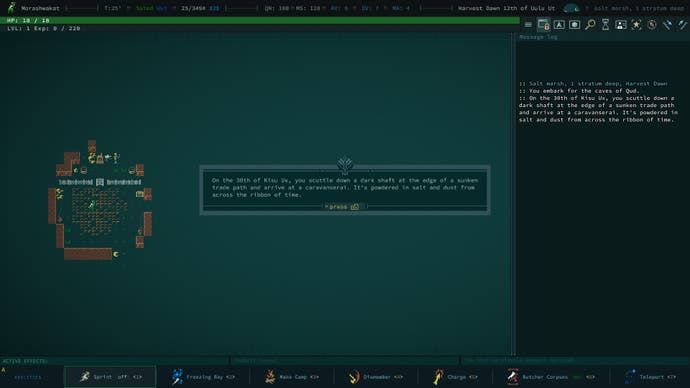
That sounds like a wonderful review. I would definitely read it. But I'm not the person to write it, alas. I'm the guy who took an ancient freight elevator to safety at a hugely inopportune moment. So I'm going to have to do something else. I'm twenty hours deep in Caves of Qud, which is enough time to play a bunch of other games twice or three times over. But in Caves of Qud, twenty hours is nothing: a blip, a flicker of glossy lashes, the merest infancy. I want to do those paragraphs where I bombard you, but insouciantly somehow, with weapon names, item names, artefacts and historical bon mots and upgrades I accidentally inflicted on this character or that. I can't. The details of the game are still a blur of text at this point. What killed me? What did I just potentially earn the right to unlock as I leveled? But what I can tell you, what I have emerged from this dauntingly complex game with, is something phenomenally direct. Looked at a certain way, this game is actually pretty straightforward. And that's wonderful. Caves of Qud is a wonderful game. You should definitely play it.
I first thought Caves of Qud was found partway on the continuum between the original Rogue at one end and Dwarf Fortress at the other. Both are lean-forward, ASCII-driven delights that you have to be in the know in order to understand, but one is a dungeon crawler in which you can be killed by the letter E (emus, I think) and the other is a simulation of an entire world and its history and all the awful drunken things that have happened since you tried to take charge.
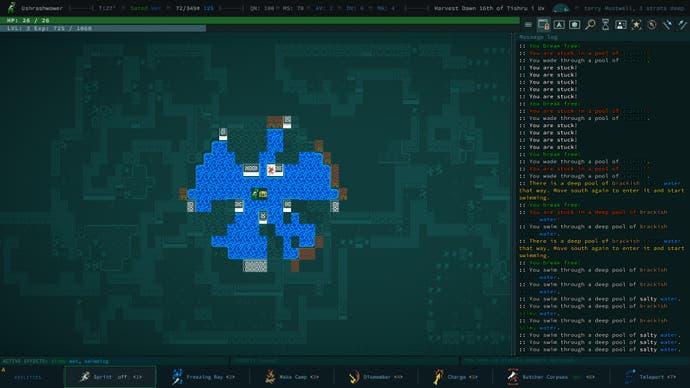
As it happens, Caves of Qud does sort of sit between these games, but that's not really the smart way to define it. It's a roguelike RPG, in essence. It takes the stuff that made Rogue so satisfying and terrifying and rich and memorable, and it says: what if you leave this single dungeon and there's an overworld? What if there are towns and NPCs and factions - dozens of them - and faction diplomacy and quest lines and a central narrative and history and customs that are rerolled every time you reroll yourself? What if there's all that new stuff and yet still, somehow, there are dungeons to crawl through absolutely everywhere? What then?
Turns out that's pretty fantastic. And it's fantastic in part because over the years it's spent in Early Access, Caves of Qud has slowly, and then very quickly, become friendlier to new players. There's a tutorial now, for starters, along with a more legible UI and tile-set. The tutorial is genuinely magnificent - compact but exciting and funny and just enough to orient you for a while so you can get a sense of the world before things get scary. Beyond that there are pre-set characters you can choose if you want, and the game tells you how viable they are from the off, so you don't have to plunge into making crucial decisions you might not yet understand the consequences of.
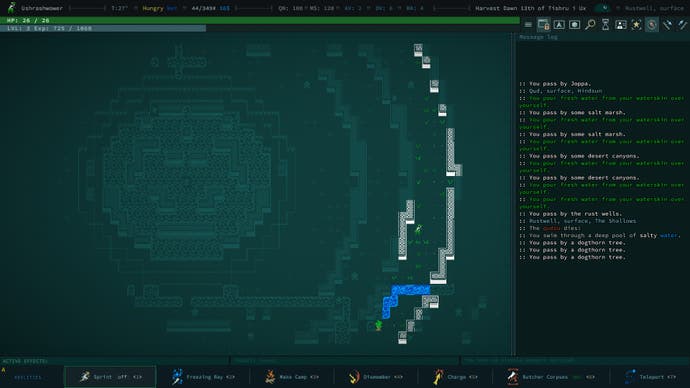
Beyond that, there are different ways to play. There's full-on permadeath misery, which is actually brisk and fun and not miserable at all. It's perfect for a chaotic twenty minutes, or much longer if you're more skilful than me. There's checkpointing at towns. There's a mode I love in which you can wander pretty much as you feel like and a lot of enemies won't try to attack you on sight. Then there's Daily Mode. And Daily Mode may actually be the way that, a thousand years from now, I will look back and realise I enjoyed the most. There's something about a game that's all-in, make notes, draw maps, keep tabs on things. There's something about playing that game on a whim, just firing it up and seeing what happens. Bad things, generally, but funny bad things. That's Daily Mode!
Unfolding from all that is the game itself. There is a world that is our world but flung so meaninglessly far into the future that it might as well be anywhere. Almost everything is ruins, and in among the ruins you can find stuff that is deeply futuristic but also completely ancient: benefits of the far, far future.You move around a map that is pretty fixed on the large scale, but which has a lot of procedural elements close up. The map is stitched together contiguously when you're closest to it, but you can also zoom out a bit for fast travel. But if you zoom out, you might run out of water, which is bad, and you can also get lost, which means you have to zoom in again and wander around for a while to get your bearings. It sounds annoying, but it's actually great: a great way to get wrapped up in something you didn't know you were looking for.
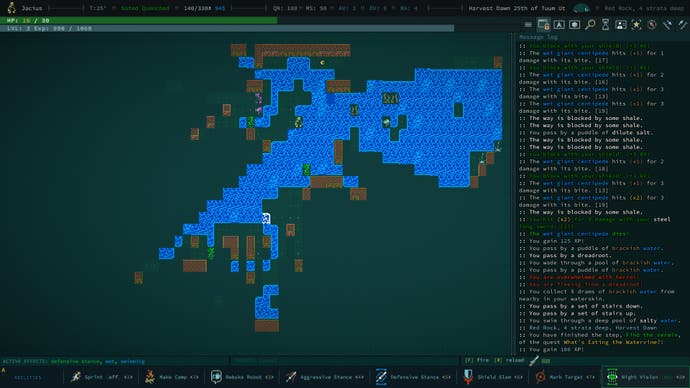
Quests and towns and the people you meet give the game shape, but a lot of the fun comes from the way you change over time as you level up, gaining powers, losing limbs, creating unlikely allies and then risking everything as you enter a new zone and more powerful baddies kill you on first sight. The world of Qud is violent and chaotic even before you get into the caves, and as you wander around it's common to see wildlife fighting wildlife before you've even gotten involved. Like Spelunky, the world is briskly, chaotically alive even without you, and there's a special halo around a game like that.
This is all delivered in dinky Rogue-ish art and it's all animated with that corrugated chug-chug-chug of a world that only takes a step when you do. It adds up to a game that feels aggressively potent, in which every lunge for a treasure chest might see you over-extending yourself, and in which incredibly bad things can happen to you as you're trying to do nothing more elaborate than map the outside of a building's wall in search of the door, or work your way through a canyon of shale.
Whisper it: even here Caves of Qud is kind of accommodating. I like to play in a sort of auto-run mode, in which I squeeze a trigger and a button and my little guy explores the entire screen by themselves, until they run out of road or something scares them and forces them to stop. As they move around, I can keep track of things by reading updates that collect on one side of the screen. It's a bit like the end of All the Presidents' Men when Nixon's downfall is delivered in frantic teletype chatter, but it's me covered in mushrooms rather than Nixon shouting at his secretary, and my downfall involves irritable tortoise things with cannons and electrical swamps rather than the fact that I bugged my own offices because I'm paranoid.
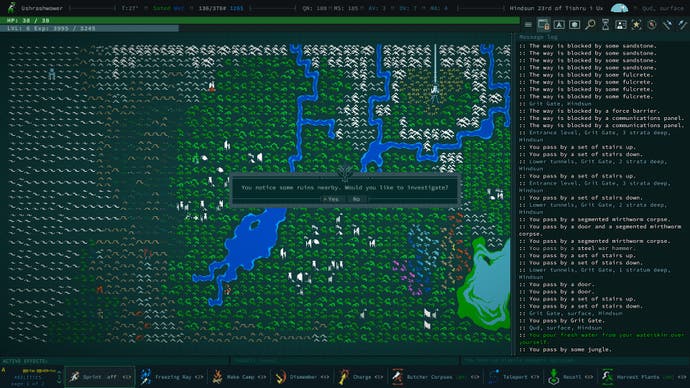
Pull back and the dungeon crawling often feeds into those quests, which take you steadily out across a world which has fixed landmarks but a history that is scrambled and rewritten - with meaningful consequences - every time you start a new game. It's a beautiful system, and I can tell that despite only understanding the most obvious edges of it. History has been written by a series of sultans here, whose likes and dislikes and general experiences have impacted the factional make-up of the world that now survives. All but one of these sultans - I think! - is procedurally built with each new game. Spelunky again: variation, but with a few strands of steel running within it to keep a little bit of shape to things. Last night I came across a remnant of a sultan named Khushid II. His life had been secretly saved from death by a pact with "highly entropic" beings. He was thenceforth known as "the Stained Shade." I am a sucker for any game that has room for "thenceforth".
I am bad at Caves of Qud, but the more I play, the more I learn to be less bad. It's that kind of game. It's not just who I should throw in with, because that stuff changes from game to game. It's not even what loot I should get or what upgrades and mutations I should aim for, because the game's at its most fun when you're making do with the stuff that chance has bunged your way.
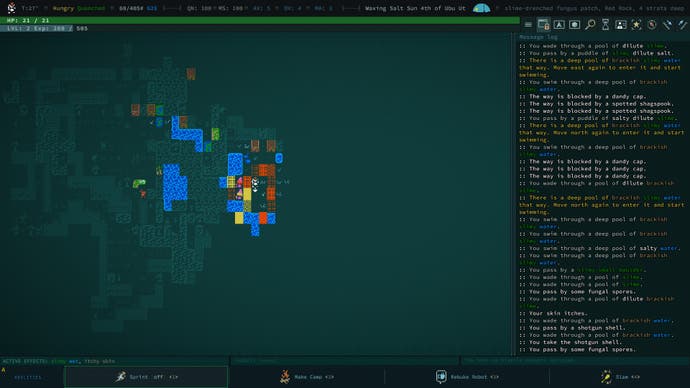
No. Learning to be less bad in Caves of Qud is all about slowing down, for me at least. It's learning that every chaotic ASCII explosion that does me in for good can actually be advanced one beat at a time, and at this speed it can be parsed, interpreted, even prodded in my favour. It's learning that every item will have something interesting written about it. That writing might help, but it also might just give me a bit of found-poetry that goes in my notebook and makes my day. It's learning that the history here mattered - whatever happened will have shaped the world I explore. And that's a thrill, even if it's a thrill that's still largely beyond me at present. It's learning that the best way to understand a system is to tinker with it, engage with it, commit to upgrades and silly trades and dangerous weapons and foolish alliances and absolutely inadvisable things to do with the game's physics system, because life is short but restarts are shorter.
I've been told that if you're good you can blitz the main campaign in Caves of Qud in about 15-20 hours. Super stuff. That's still far beyond me, and I don't really mind. This is one of those games where you play across it as much as you do by following the grain of it. You can trot along with the beats and the objectives and the power curve. But you can also just lose yourself in distractions and strange enmities and in the joys of procedural archaeology. Lose yourself! That's the best way to play this game. And maybe it's the way to truly win.
A copy of Caves of Qud was provided for review by publisher Kitfox Games.


